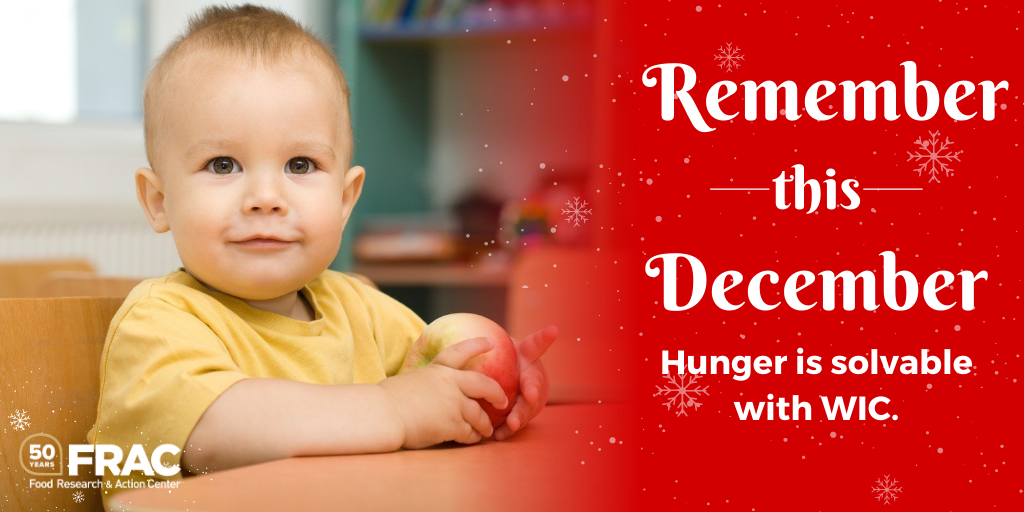December 18, 2020
During the holidays and all year long, millions of individuals and families who struggle against hunger are able to access healthy food with support from the federal nutrition programs. To celebrate the nation’s nutrition safety net, FRAC is releasing a seven-part “Remember This December” series that will highlight the impact of seven important federal nutrition programs.
This year, the federal nutrition programs have played a critical role in ensuring people can continue to put food on the table during the twin COVID-19 public health and economic crises.
This is the fourth installment of the series, which focuses on the Special Supplemental Nutrition Program for Women, Infants, and Children (WIC). Read the previous installment on CACFP.

Good health and nutrition are critical at all stages of life, but especially during the earliest years when development is still taking place. WIC provides low-income pregnant women, new mothers, infants, and young children with nutritious foods, nutrition education, and improved access to health care in order to prevent nutrition-related health problems in pregnancy, infancy, and early childhood.
During the COVID-19 crisis, the United States Department of Agriculture (USDA) enabled WIC to request waivers that grant flexibilities and contingencies based on the Families First Coronavirus Response Act. These waivers support WIC agencies in maintaining safe access to food benefits, nutrition and breastfeeding support, and referrals to services for women, infants, and children during the COVID-19 public health emergency.
Learn more with FRAC’s guide to connecting people to the federal nutrition programs during COVID-19.
Below are essential facts to know about WIC:
- WIC fights the negative impacts of food insecurity and poor nutrition: A large body of research has made it clear that WIC benefits the health, development, and general well-being of young children and their families. Participation in the program has been found to have a favorable impact on birth outcomes, breastfeeding outcomes, obesity rates, and even dietary quality.
- WIC fights the impact of poverty: Alongside food insecurity and poor nutrition, poverty is considered a public health issue for young children. WIC has shown itself to be an important anti-poverty program: WIC lifted 275,000 people out of poverty in 2018.
- WIC matters for millions of mothers and children: In 2017, the program provided support to approximately 1.7 million women, 1.8 million infants, and 3.8 million children in an average month.
- WIC matters for communities: WIC food packages include fruits, vegetables, whole-grain products, and lower-fat milk products. Research suggests that the packages have increased the availability, variety, quality, and affordability of healthy foods at food retailers in communities around the country.
Learn more about the program at FRAC.org, and share our “Remember This December” WIC graphic.
Watch our video on the importance of the federal nutrition programs.


